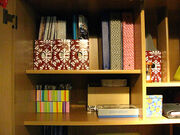
organized shelves
Among its many other purposes, a home gives us places to store and organize our belongings.
Organization helps us find and use items. Sometimes it's fun -- like organizing pictures in a scrapbook.
Organizing is somewhat of a way of categorising things such as placing cutlery in a pot or sorting out recycling material.
Methods[]
There are many different ways of organizing things. Like most things each rule has its exceptions, and you may want to try a couple of different methods until you find the one(s) that work best for you.
Put "like" things together[]
With this method you put similar object together. This may only be the first step and your definition of what's similar may be different from your neighbors. Some examples are
- put all the dishes together
- exceptions: you probably want to put and store the clean dishes separately from the dirty ones
- put all the towels and wash clothes together
- exceptions: you probably want to put and store the clean linens separately from the dirty ones; you may want to store items for cleaning dishes, the car, the pets, the floors, the people, etc. in different places; if you home is large, you might want to store some items on the first floor and others of the same type on the second
Sometimes collecting the similar items is only a first step. Once you've collected all the scissors, you may realize that you have more pairs than you need, and some you prefer to use. Then you can decide whether the next step might be to get rid of unnecessary duplicates (donations, recycle, etc.) before figuring out when to store the items.
Put things near where you'll use them most[]
For instance, keep potholders near the stove, towels near the bathroom or kitchen, phonebooks by the telephone.
Put things together with other things you'll need at the same time[]
This is a variation on putting things with other things "like" them. However, in this case the things may not be similar to each other, but unified by how they are used. For instance, envelopes, stamps, return address stickers, a checkbook, check ledger and bin for bills may be kept together as "bill paying supplies".
- put clothes that are only worn in winter together
Put things with similar storage needs together[]
For instance, things that will be damaged by heat can be kept together with a warning note to keep away from heat.
Don'ts[]
There are exceptions to every rule, but here are some things you should avoid in general.
- Don't put something big on top of something small. (Like your coat on top of your keys.)
- Don't store things that are harmed by the damp in the basement, at least not without precautions. (For instance cardboard can be damaged by damp and mold. So, it's better to store things in plastic.)
Related[]
References[]
- Reader's Digest on Organize Your Home
- lifeorganizers.com on how to Organize Your Home
- Organized Home.com
- Howto wiki on How to organize your belongings
- MiracleOrganizing.com's Clutter-free Resources
- Home Organization Online has a quiz on Organizing Quiz: Do You Have The Clutterbug?, along with helpful hints and links to additional resources
The following are commercial sites for professional organizers:
- Professional Certifications and Organizations
- National Association of Professional Organizers (U.S.)
- Professional Organizers of Canada (POC)
- Certified Professional Organizers
- Professionals and Companies
- Organizing Your Home - Kelly Germain
- Clutter Free Organizing (Michigan and other US locations) - Judy Lubowicki
- Professional Organizers.com